Circuit Breaker Won't Reset? 4 Reasons & Solutions
Author: Omar Alonso | Editor: Omar Alonso
Review & Research: Jen Worst & Chris Miller
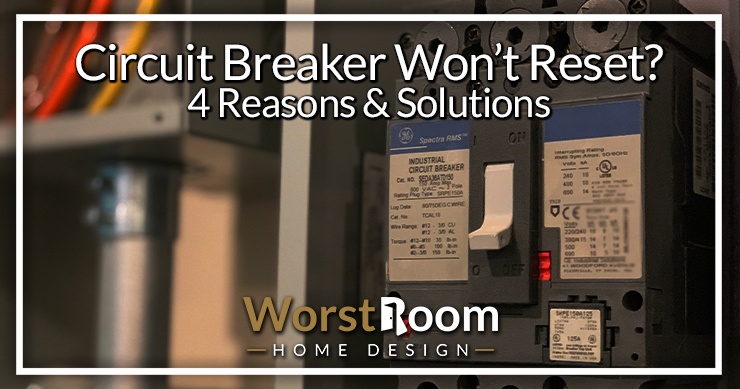
If your tripped circuit breaker won't reset, there's a high probability that it may just be doing its job of tripping to protect the circuit. You must replace the circuit breaker if it is indeed broken, as it isn't repairable anymore. But you'll never know for sure until you diagnose the problem correctly.
In this post, we'll discuss the common reasons why circuit breakers won't reset and how to troubleshoot the problem.
How Circuit Breakers Work & Reasons Why Breakers Trip
Before we dig into the circuit issue, here's a bit of a refresher on how circuit breakers work and why they're designed to trip. If you're having trouble locating your breaker box, here are all the places you would find it.
What Is a Circuit Breaker?
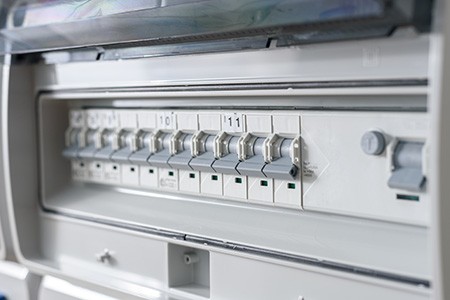
A circuit breaker is an electrical safety device created to protect an electrical circuit from damage caused by a short circuit or overcurrent. This device keeps our homes safe from overheating and potential fire hazards, ensuring the electricity that enters your home from lights, appliances, and gadgets does not rise to dangerous levels.
Circuit breaker boxes or fuse boxes have several circuits. Each circuit is protected by a breaker or fuse that limits the current (measured in amperage) allowed to safely pass through that particular circuit.
- Bedrooms with just lights and small electrical items are often assigned 15-amp circuits
- Kitchens, bathrooms, and rooms with major appliances are served with 20-amp circuits
- 30-amp or higher circuits also exist for multi-machine laundry rooms and similar rooms
Despite these differences, they all run through your main circuit breaker cluster, but you can easily identify which circuit is causing the problem by seeing which circuit breaker tripped and won't reset. This will help you begin to narrow down the issue.
Why Does a Circuit Breaker Trip?
When the electrical power usage goes beyond the assigned amp rating of a circuit, the breaker will trip. It means the circuit is broken, and you'd have to reset it manually before the current could flow into that particular circuit again.
Common reasons why breakers trip are:
- Old circuit breaker
- Too many lights or devices plugged into just one circuit
- Arc fault due to spark-inducing wires (that are either loose or corroded)
- Short circuits due to sudden electrical spike passing through one circuit
Remember, when a circuit breaker trips, it’s generally always about the amp rating being exceeded, which is often caused by a voltage spike. When a circuit breaker won't reset, you have a different issue on your hand which we'll cover in a moment.
How Do You Know the Circuit Breaker Has Tripped?
If your computer suddenly shuts off along with other appliances like fans and lights nearby, but power in the next room is still on, this is a good sign that your circuit breaker has tripped.
To confirm if it has tripped, go to your circuit breaker box and reset it. It is considered a tripped switch if it is positioned between "on" and "off."
4 Reasons Why Circuit Breakers Trip & the Solutions
Below are the most common reasons why circuit breakers trip.
1) Did Not Reset the Breaker Correctly
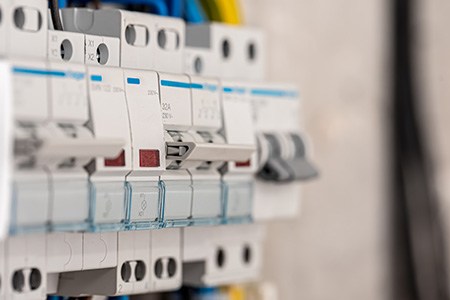
The easiest mistake to make is assuming the tripped breaker won't reset due to a busted breaker, but the cause is much simpler. Before you do any diagnosing, double-check for improper breaker reset.
Some homeowners weren't hands-on when installing the circuit breaker and may not know which switch corresponds to which room. If this is the case, check if the circuit breakers are mislabeled (and correct them). This is the best time to label your circuit breakers if it isn't labeled at all. And you'll avoid any future issue of resetting the wrong switch.
Incorrectly Reset Breaker Solution
Also, there's a right way and wrong way to reset a breaker:
- Wrong: Flip to the "on" position.
- Right: Flip to the "off" position until you hear a clicking sound, and flip it back to the "on" position, making sure you hear the click again.
If you followed the proper way of resetting your breaker, but it still trips, continue to diagnose your circuit problem.
2) Overloaded Circuits
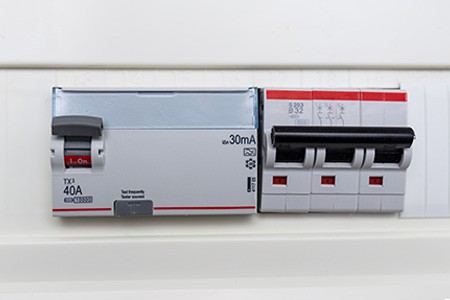
Whenever too much electrical current flows through a circuit, it leads to electrical overload. To avoid causing additional damage to your wiring and all devices plugged into that circuit, the circuit breaker trips and breaks the circuit.
Common things that cause circuit overloads are:
- Too many devices plugged into one circuit
- Multiple curling irons or blow dryers used simultaneously
- Faulty breaker or fuse
- Faulty lighting fixture
- Faulty devices (that pull too much power)
- New appliances plugged into a fully-loaded circuit
- Deteriorating insulation that covers up your home's wiring
You'll know your circuit is overloading if there are flickering or dimming lights. Frequent circuit breaker trips are also major signs of overloaded circuits. If a tripped circuit breaker won't reset, it could be an ongoing overload, meaning it immediately re-trips.
Circuit Overloading Solution
To solve this, you first need to unplug any devices from the outlets and turn off lights connected to the problematic circuit. Let the devices cool for several minutes, then try resetting the circuit breaker.
If it works, one of your devices could be the culprit. Plug the devices back one by one to pinpoint which demands too much electrical load. Move some devices to other circuits.
If you hear sizzling receptacles or smell a burning odor near the switches, these can be serious overloading effects. You need to call an electrician immediately.
3) Short Circuit (Internal Damage of Appliances or Lighting Fixtures)
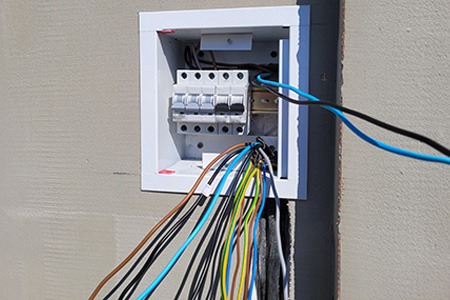
A short circuit is an abnormal condition when two electrical wires come into contact and flood the circuit with a current it isn't designed to handle. The circuit breaker trips whenever short circuits happen to outlets, switches, and appliances.
Common causes of short circuits include the following:
- Loose wires
- Deteriorating electrical wire cables
- Rodents or large insects biting through wires
- Fluids touching uninsulated electrical wiring, like a leaking mini fridge on carpet
- Damaged or old lighting, outlets, switches, appliances, and other devices
- Abnormal electricity surges
- Open ground (incorrectly-grounded wires that affect all outlets)
There are clues that you're dealing with a short circuit. The break trips when you plug a device or appliance into an outlet or turn on a certain switch. The affected device is usually specific and not grouped within an area (like what happens with overloading).
Short Circuit Solution
Because you're dealing with hot wires and the risk of electrical shock, you'll need an electrician's help for short circuit issues. You can help the electrician identify the suspected outlet, switch, or appliance by testing. If a circuit breaker won't reset, it could be an ongoing short that immediately trips the breaker when you reset it.
- Suspected switch short circuit: Flip the switch on and wait if the breaker trips. If it does, that switch is your culprit. Flip the switch off.
- Suspected outlet short circuit: Plug a device into the outlet and wait if it trips the breaker. If it trips immediately, this particular outlet is the problematic one. Unplug your device to avoid potential issues.
- Suspected devices causing short circuits: Unplug the device and plug it into a different outlet. If the breaker trips to the new outlet, your device is the issue. Unplug it quickly, and don't use that device anywhere else.
Once you've pinpointed the cause of short circuits, let your electrician know about your testing so they can double-check and fix the issue appropriately.
4) Faulty Circuit Breaker
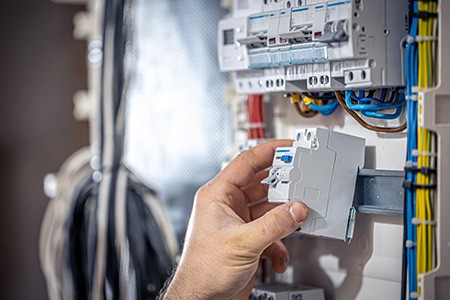
A broken circuit breaker isn't a common reason you're having problems resetting the circuit breaker. However, if none of the problems and troubleshooting above work, it could boil down to a faulty, busted, or blown breaker.
Circuit breakers are not designed to be fixed, so once they break, your only solution is to have them replaced. After all, circuit breakers are your home's safety mechanisms put in place to protect you and your house from electrical problems.
Faulty Breaker Solution
The only sign of a faulty breaker is if you try to push the breaker switch to the "off" position and it springs back between "on" and "off" positions. If this happens, call your electrician to get your circuit breaker replaced.
Calling a Pro When a Circuit Breaker Tripped & Won’t Reset
If you know your way around your wiring and circuit breakers, you can fix the problem yourself, but only if the cause of the problem is either improper resetting or overloaded circuits.
If you don't have any DIY experience, it is best to call a licensed electrician to handle bad outlet connections, internal damages to lighting or appliances, open ground, or faulty breakers. The electrician would know how to replace the breaker professionally. They would also ensure that no electrical wiring remains faulty and address other underlying problems.
Other reasons to call an electrician include:
- Faulty breakers
- Suspected short circuits
- Ground faults
- If the box has to be replaced, but you don't know the voltage rating of your circuit breaker
Whether you DIY the circuit breaker dilemma or go with a pro, get the problem fixed ASAP. Ignoring electrical issues like this one could lead to fire, damage to your property, or even death. The sooner you learn why the tripped circuit breaker won't reset and have it fixed, the more time and money you'll save.



